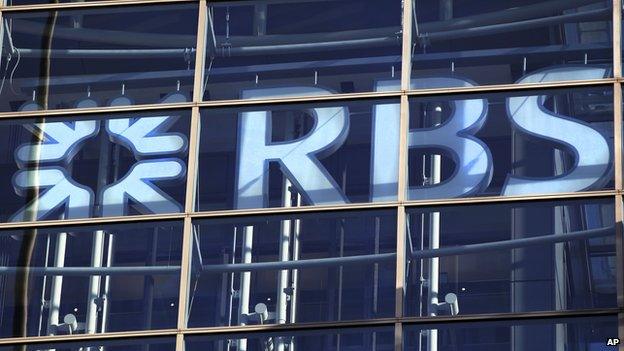Scottish independence: RBS should be broken up, says pro-independence group
- Published

The UK government has no immediate plans to sell RBS
Royal Bank of Scotland should be broken up in an independent Scotland, a pro-independence group has said.
Options For Scotland (OFS) said the Scottish government should have a majority stake in the Scottish arm of RBS.
Pro-independence campaign Yes Scotland said OFS had made "an interesting contribution" to the debate.
But Better Together campaign leader Alistair Darling said independence would cost jobs in Scotland's banks.
OFS, which is led by former SNP leader Gordon Wilson, unveiled a report written by Ian Blackford, a former merchant banker and one-time treasurer of the party.
Mr Blackford proposed policies for RBS, Lloyds and Clydesdale bank if voters back "Yes" in September's referendum and Scotland becomes independent.
His report argued that:
it is in the interests of both Scotland and the rest of the UK that RBS be broken up into its constituent parts
the Scottish government would inherit a majority stake in the new bank created from the Scottish arm of RBS
the new bank should be privatised and returned fully to the capital markets as soon as practical
there should be a ring-fenced RBS "bad bank" containing any dubious loans which should be ring fenced in Scotland as it was in the UK
the Bank of Scotland element in Lloyds Group should be spun-off if possible with the primary aim of serving Scottish customers
the Scottish government should try to persuade owners the National Australia Bank to float the Clydesdale Bank if no buyer is found
The 2008 financial crisis led to RBS receiving a £45bn bailout from the UK government, which retains an 81% stake in the bank.
Last year the government disposed of 6% of Lloyds, which was also bailed out in 2008, cutting its stake from 38.7% to 32.7%.
Mr Blackford said: "There are no UK plans to spin off the Scottish sections of banks like RBS and Lloyds who are no longer run from Scotland.
"The legacy of the financial crisis of 2007-8 is still with us, the UK banks are constrained by the failures of the past."
He added: "Independence will give Scotland the opportunity to restructure the former Scottish banks and return to them the power to contribute more sensitively and relevantly to the priorities of reviving Scotland's economy than is the case at present."
A Yes Scotland spokeswoman said: "This is an interesting contribution to the referendum debate as Scotland considers the choice of two futures."
The pro-Union Better Together campaign claimed that independence would damage rather than enhance Scotland's banking sector.
Mr Darling, a former UK Chancellor of the Exchequer, said: "There are thousands of people in Scotland working in banks and insurance companies.
"They work for customers who are based across the whole of the UK. It's clear that if we break up the UK it would cost jobs here in Scotland.
"If that's what the nationalists want to do, they should at least be upfront about it."